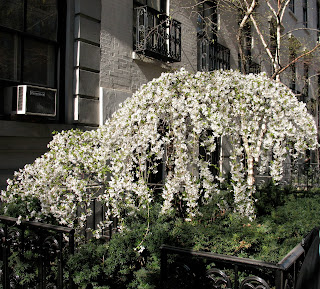NEW SALON: READINGS AND CONVERSATIONS
Heather McHugh, with Robert N. Casper
A reading and conversation in an intimate format.Robert Casper introduced the poet as a former teacher of his, and it was clear how much respect and awe and admiration he had for her. However, when he asked her to start the evening with a reading, she was expecting conversation, and her post-it note laden notes on topics showed that she was prepared for an interview more than for a poetry reading.
McHugh was good-natured and even joyous throughout her remarks, which were many and beautifully spoken in perfect English about what has meaning to her in her writing. " I write in order to find what I mean," she said at one point. She read the poem that was provided for those of us who did not come with books in hand, "Fastener,"
Fastener
One as is as another as.
One with is with another with;
one against's against all others and one of
of all the ofs on earth feels chosen. So the man
can't help his fastening on many
(since the likes of him like
look-alikes)...When the star-shower crosses
the carnival sky, then the blues of the crowd
try to glisten, to match it; and the two
who work late in the butcher-house touch,
reaching just the same moment
for glue and for hatchet.
When I heard her read it it made sense. Reading it on the page I struggle with the meaning and the sounds crashing into each other. Those first four lines trip me up with their use of conjunctions and prepositions as nouns. But McHugh's playfulness and lightness of touch made it all clear. She was almost apologetic about how she got expressive after the first four lines, as if it were the weakness in her writing, when in fact it is the part that I like best.
She was very at ease riffing on ideas, pulling snatches of poems by Emily Dickinson out of her fecund brain by heart, and she quoted Borges, and Wittgenstein ("Our lives are endless precisely in the ways our visual lives are endless.")
Here is what I remember:
--We live in our senses. All five senses have verbs that can be used either in the transitive or intransitive case.
--It is important to entertain both sides of every question, consider opposites, to not just go for the knee jerk response or emotional simplicity of things. Dare to be complex.
--The root of skepticism is in looking.
There is a beautiful more accessible poem on the poets.org website,
What He Thought.
For Fabbio Doplicher
We were supposed to do a job in Italy and, full of our feeling for ourselves (our sense of being Poets from America) we went from Rome to Fano, met the Mayor, mulled a couple matters over. The Italian literati seemed bewildered by the language of America: they asked us what does "flat drink" mean? and the mysterious "cheap date" (no explanation lessened this one's mystery). Among Italian writers we could recognize our counterparts: the academic, the apologist, the arrogant, the amorous, the brazen and the glib. And there was one administrator (The Conservative), in suit of regulation gray, who like a good tour guide with measured pace and uninflected tone narrated sights and histories the hired van hauled us past. Of all he was most politic-- and least poetic-- so it seemed. Our last few days in Rome I found a book of poems this unprepossessing one had written: it was there in the pensione room (a room he'd recommended) where it must have been abandoned by the German visitor (was there a bus of them?) to whom he had inscribed and dated it a month before. I couldn't read Italian either, so I put the book back in the wardrobe's dark. We last Americans were due to leave tomorrow. For our parting evening then our host chose something in a family restaurant, and there we sat and chatted, sat and chewed, till, sensible it was our last big chance to be Poetic, make our mark, one of us asked "What's poetry? Is it the fruits and vegetables and marketplace at Campo dei Fiori or the statue there?" Because I was the glib one, I identified the answer instantly, I didn't have to think-- "The truth is both, it's both!" I blurted out. But that was easy. That was easiest to say. What followed taught me something about difficulty, for our underestimated host spoke out all of a sudden, with a rising passion, and he said: The statue represents Giordano Bruno, brought to be burned in the public square because of his offence against authority, which was to say the Church. His crime was his belief the universe does not revolve around the human being: God is no fixed point or central government but rather is poured in waves, through all things: all things move. "If God is not the soul itself, he is the soul OF THE SOUL of the world." Such was his heresy. The day they brought him forth to die they feared he might incite the crowd (the man was famous for his eloquence). And so his captors placed upon his face an iron mask in which he could not speak. That is how they burned him. That is how he died, without a word, in front of everyone. And poetry-- (we'd all put down our forks by now, to listen to the man in gray; he went on softly)-- poetry is what he thought, but did not say.














